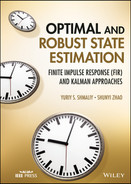A unified and systematic theoretical framework for solving problems related to finite impulse response (FIR) estimate Optimal and Robust State Estimation: Finite Impulse Response (FIR) and Kalman Approaches is a comprehensive investigation into batch state estimators and recursive forms. The work begins by introducing the reader to the state estimation approach and provides a brief historical overview. Next, the work discusses the specific properties of finite impulse response (FIR) state estimators. Further chapters give the basics of probability and stochastic processes, discuss the available linear and nonlinear state estimators, deal with optimal FIR filtering, and consider a limited memory batch and recursive algorithms. Other topics covered include solving the q-lag FIR smoothing problem, introducing the receding horizon (RH) FIR state estimation approach, and developing the theory of FIR state estimation under disturbances. The book closes by discussing the theory of FIR state estimation for uncertain systems and providing several applications where the FIR state estimators are used effectively. Key concepts covered in the work include: Optimal and Robust State Estimation: Finite Impulse Response (FIR) and Kalman Approaches was written for professionals in the fields of microwave engineering, system engineering, and robotics who wish to move towards solving finite impulse response (FIR) estimate issues in both theoretical and practical applications. Graduate and senior undergraduate students with coursework dealing with state estimation will also be able to use the book to gain a valuable foundation of knowledge and become more adept in their chosen fields of study.
Table of Contents
- Cover
- Title Page
- Copyright
- Dedication
- Preface
- Foreword
- Acronyms
- 1 Introduction
- 2 Probability and Stochastic Processes
- 3 State Estimation
- 4 Optimal FIR and Limited Memory Filtering
- 5 Optimal FIR Smoothing
- 6 Unbiased FIR State Estimation
- 7 FIR Prediction and Receding Horizon Filtering
- 8 Robust FIR State Estimation Under Disturbances
- 9 Robust FIR State Estimation for Uncertain Systems
- 10 Advanced Topics in FIR State Estimation
- 11 Applications of FIR State Estimators
- Appendix A: Matrix Forms and Relationships
- Appendix B: Norms
- Appendix C: Matlab Codes
- References
- Index
- End User License Agreement
